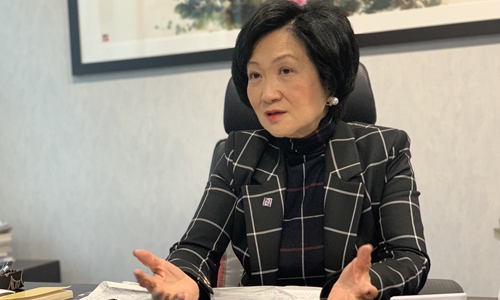HK law needs ‘run-in’ : Ip
By Chen Qingqing and Bai Yunyi Source:Global Times Published: 2020/7/3 23:38:41

Regina Ip Lau Suk-yee Photo: Zhao Yu/GT
It's been less than a week since the national security law for Hong Kong was passed and enacted, which still needs a "run-in" process in fitting in with the local law and enforcement procedures in the city, with more detailed ordinances under the law expected to come out to handle different situations and accurately enforce the law, Regina Ip Lau Suk-yee, a member of the Executive Council and former security secretary, told the Global Times on Friday.
Under Hong Kong's common law system, deciding whether someone violated the law would be a combination of law and evidence. For example, the national security law for Hong Kong has not detailed the possible offenses, while the Department of Justice would give out clear and professional explanation, Ip noted.
"When analyzing each case, it should clarify the suspect's intention to decide whether he violates the national security law or other laws in Hong Kong," she said.
Ip made the comments after the Hong Kong Special Administrative Region (HKSAR) government said on Thursday that the slogan, "Liberate Hong Kong, Revolution of Our Time," implies secessionism, alienating HKSAR from China, changing HKSAR's legal status or subverting State power under the current circumstances. Such a statement was made after the Hong Kong Police Force (HKPF) arrested 10 people for allegedly violating the national security law for Hong Kong. Among those, several were arrested for showing materials with "Hong Kong Independence" slogans.
Some opposition and extremist forces, who have been smearing the HKSAR government and HKPF since the social turmoil in 2019, have been criticizing the recent arrests by claiming that the central and local governments are trying to suppress freedom of press by silencing activists, cracking down on online speech, and prohibiting all types of anti-government slogans, as well as posters and banners.
"If a person owns some objects suspected of promoting the slogan 'Hong Kong independence', owning the objects might not be offense, but if this is part of organized activity, it might have problems," she said, adding that the intent behind those moves are the most important factors to be considered.
Ip said she does not believe any 'Culture Revolution'-style campaigns in the city exist at present when Hong Kong secessionists like Joshua Wong compared law enforcement to "White Terror" with arbitrary prosecutions, secret trials or curbing public opinion.
"There will be a process for the national security law and local laws in Hong Kong to work with each other, which still needs more time to see the effect," Ip said.
On concerns that the new law may erode the judicial independence of Hong Kong, Ip said some agencies apparently go beyond the HKSAR according to the law, referring to the chief executive appointing a number of judges under the national security law for Hong Kong.
However, like Chief Justice Geoffrey Ma has said on the designation of judges and the operation of courts are concerned, these two aspects must be subject to the requirements of the Basic Law, while judges of foreign nationality are not excluded.
The foreign media and governments have been holding biased views toward our political system, deeming it as an authoritarian government. But they ignore the fact that the law states that most cases would be handled by the local law enforcement mechanism, Ip said.
Article 14 states that no institution, organization or individual in the HKSAR shall interfere in the work of the Committee for Safeguarding National Security of the Hong Kong. Information related to the work of the Committee shall not be subject to disclosure. Decisions made by the Committee shall not be open to judicial review.
This is different from our common arrangement, as under the common law, all decisions made by public bodies are subject to judicial review, Ip said.
But according to the international convention on human rights, all freedoms are not absolute and can be restricted by law on national security matters, Ip said.
Given that some critics say the committee is too powerful or erodes judiciary independence, Ip said national security-relevant laws have characteristics of supremacy, and relevant laws in every country would give administrations more power.
"Law enforcement authorities have been empowered a lot, especially in intercepting communications and information monitoring," she said.
As for how to properly implement the law, instead of abuse of the law, Ip said that the new prosecution division will decide whether the original intention was secession or other crimes listed in the law. "But we still don't have enough experience in this sector, and we will fumble along the way," she said.
Posted in: HK/MACAO/TAIWAN